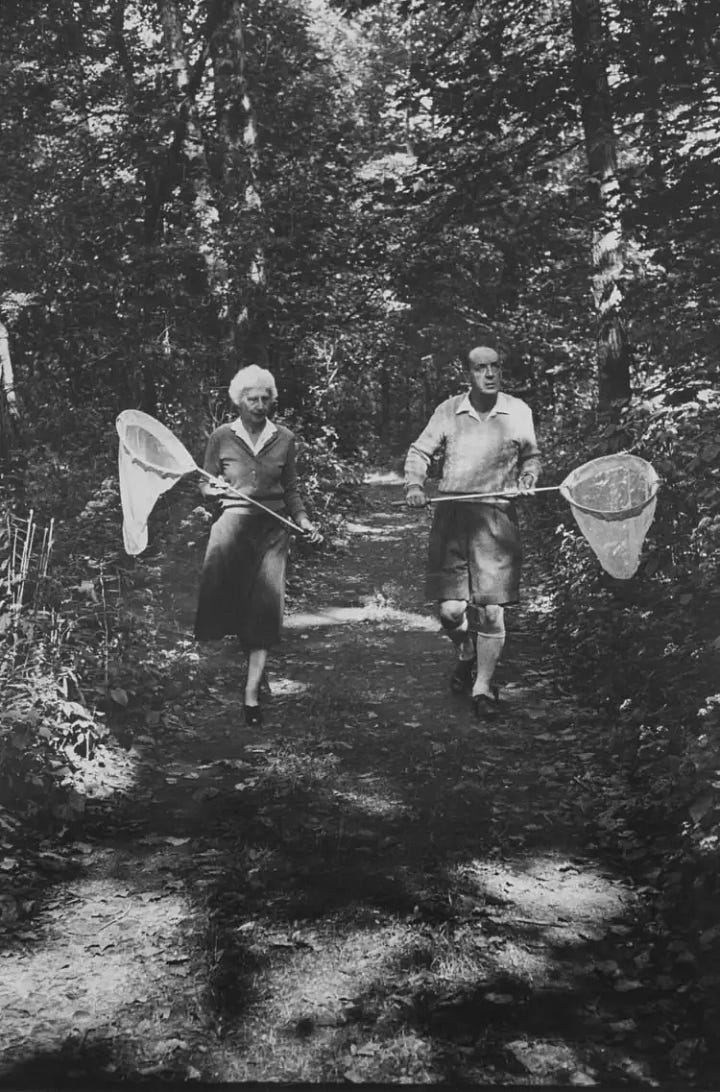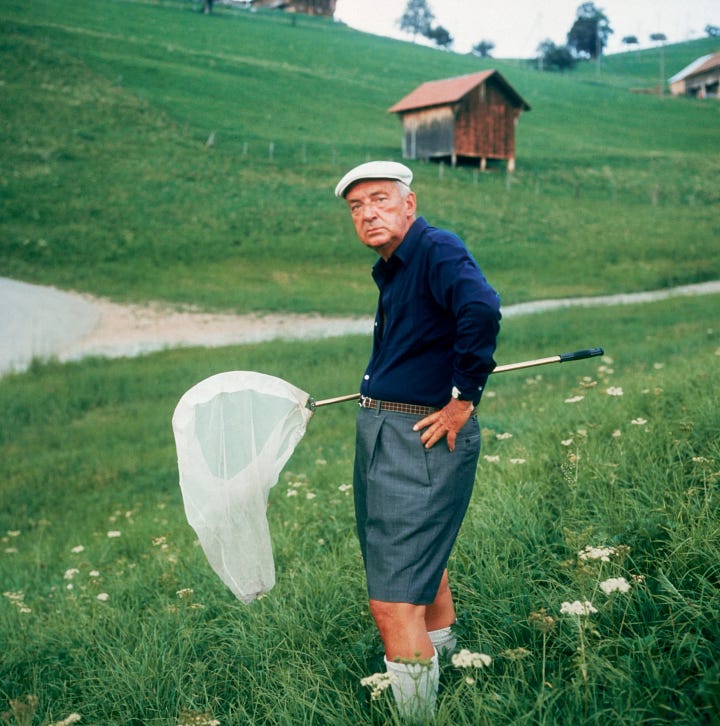Welcome to launch of the Desperate Readers newsletter! Every week we’ll be posting tidbits, photos, video, things we wished we’d said, thoughts that couldn’t make it into the episode, and maybe even a recipe or two. Some weeks we’ll give exclusive recommended reading that we won’t cover on the pod. If you haven’t already, subscribe below to get a curated curio bag of literary musing each week!
This week it’s all thing Vladimir Nabokov, the famous Russian novelist turned American expat. If you haven’t listened to it yet, consider listening to our episode on Lolita. There’s a load of things we couldn’t add into the podcast and this post doesn’t cover half of it!
XXXIII. How Did they ever Make a Podcast of Lolita
Listen now (46 mins) | A true American classic! Niko and Tatiana read Vladimir Nabokov's Lolita and discuss eroticism, the English language, and America!
But on to the photos!
Nabokov, the Lepidopoterist


“Literature and butterflies are the two sweetest passions known to man.” In his memoir describing his aristocratic upbringing in Russia, Speak, Memory, Nabokov dedicates a whole chapter to his obsession with butterflies, describing his early fascination and care care for specimens. The essay was originally published in the New Yorker, in 1948. In a humorous passage, he describe how others have reacted upon finding a man in the wild with only a butterfly net.
I also found out very soon that a “lepist” indulging in his quiet quest was apt to provoke strange reactions in other creatures. How often, when a picnic had been arranged, and I would be self-consciously trying to get my humble implements unnoticed into the tar-smelling charabanc (a tar preparation was used to keep flies away from the horses) or the tea-smelling Opel convertible (benzine forty years ago smelled that way), some cousin or aunt of mine would remark: “Must you really take that net with you? Can’t you enjoy yourself like a normal boy? Don’t you think you are spoiling everybody’s pleasure?” Near a sign NACH BODENLAUBE, at Bad Kissingen, Bavaria, just as I was about to join for a long walk my father and majestic old Muromtsev (who, four years before, in 1906, had been President of the first Russian Parliament), the latter turned his marble head toward me, a vulnerable boy of eleven, and said with his famous solemnity: “Come with us by all means, but do not chase butterflies, child. It spoils the rhythm of the walk.” On a path above the Black Sea, in the Crimea, among shrubs in waxy bloom, in March 1918, a bow-legged Bolshevik sentry attempted to arrest me for signaling (with my net, he said) to a British warship. In the summer of 1929, every time I walked through a village in the Eastern Pyrenees, and happened to look back, I would see in my wake the villagers frozen in the various attitudes my passage had caught them in, as if I were Sodom and they Lot’s wife. A decade later, in the Maritime Alps, I once noticed the grass undulate in a serpentine way behind me because a fat rural policeman was wriggling after me on his belly to find out if I were not trapping songbirds. America has shown even more of this morbid interest in my retiary activities than other countries have—perhaps because I was in my forties when I came there to live, and the older the man, the queerer he looks with a butterfly net in his hand. Stern farmers have drawn my attention to NO FISHING signs; from cars passing me on the highway have come wild howls of derision; sleepy dogs, though unmindful of the worst bum, have perked up and come at me, snarling; tiny tots have pointed me out to their puzzled mamas; broad-minded vacationists have asked me whether I was catching bugs for bait; and one morning on a wasteland, lit by tall yuccas in bloom, near Santa Fe, a big black mare followed me for more than a mile.
Hear him Speak!
Filmed while translating Lolita into Russian, Nabokov gave this unmediated interview in 1965, in Montreux, Switzerland, where he eventually died in 1977. The video gives a wonderful unmediated glimpse at the writer’s process, his life in Europe, and Chess games with his wife, Vera.
Other Articles…
What to read more Nabokov? Don’t know where to start? Molly Young recently detailed the “Essential Vladimir Nabokov” for the New York Times.
The Art of Fiction with Nabokov in the Paris Review.
The New Yorker confirms our claim that Lolita is an American novel.




